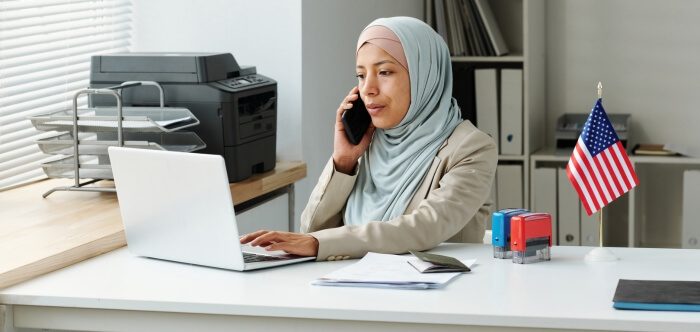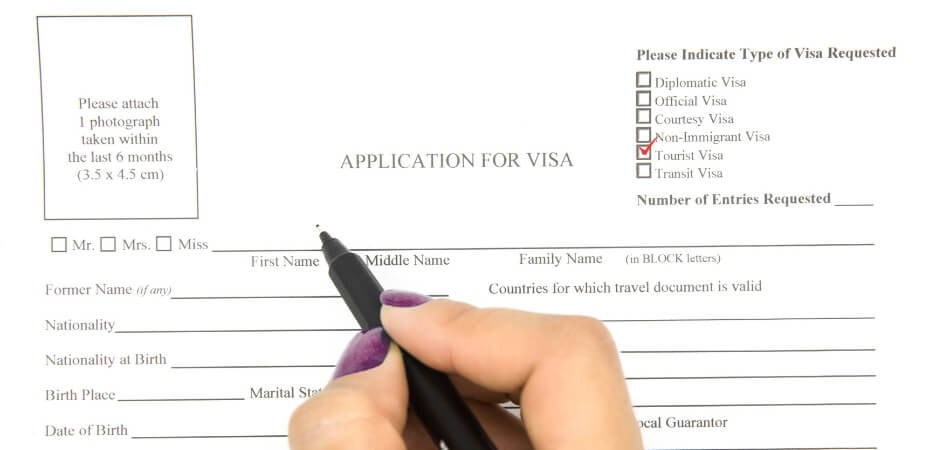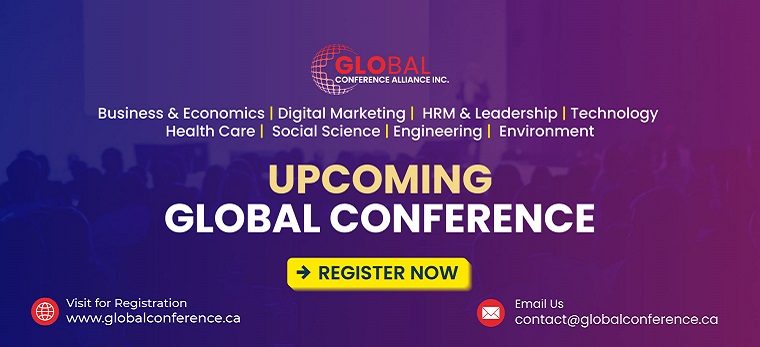Traveling to new destinations can be an exciting prospect, but when obtaining a visa, many find themselves puzzled by the prolonged waiting period. You might be wondering, “Why does it take so long to get a Tourist visa to USA?”
The main reasons why getting a tourist visa to the USA takes so long are security checks, the volume of applications received, and the requirement for extensive background checks to guarantee immigration compliance and national security.
As you proceed on this reading journey, we’ll dive deeper into these reasons and help you navigate the complexities of the U.S. visa process. Stick with us to unlock the mystery behind this extensive procedure and arm yourself with the knowledge you need for a smoother visa application.
Visa Application Process For The USA – The Thing You Have to Know First
The USA, known for its stringent immigration policies, has a visa application system that demands thoroughness. Applicants kick-start the process by selecting an appropriate visa category, such as tourism, business, or education. This choice dictates the documents required and the subsequent steps to be taken.

The primary goal during this phase is to ensure every applicant meets the set criteria for their chosen visa type. Therefore, the same process applies to those who want to attend a conference in the USA from other countries. Following this, an interview at the nearest U.S. embassy or consulate is usually the next step.
During this face-to-face interaction, visa officers assess the applicant’s intent, background, and eligibility. The importance of this meeting cannot be understated, as it forms the crux of the decision-making process. A well-prepared applicant stands a better chance of a favorable outcome.
Upon passing the interview, the applicant undergoes meticulous background and security checks. These screenings delve into personal histories, affiliations, and any potential risks the applicant might pose. It’s a testament to the country’s commitment to maintaining national security and ensuring only genuine visitors are granted entry. This final step often accounts for the lengthy wait associated with U.S. visa approvals.
Types of USA Visas and Processing Times
The United States offers a vast array of visa categories, catering to diverse intentions and purposes. From tourists to entrepreneurs, there’s a visa designed for almost every visitor. Here’s a glimpse into some prominent USA visa types and their processing times.
Tourist Visa (B-2)
Renowned as the B-2, this visa is designed for leisure and medical treatment purposes. Tourists usually obtain this visa for sightseeing or visiting family. The average processing time ranges from a few weeks to a couple of months, depending on application volume and specific circumstances.
Business Visa (B-1)
Business travelers seeking short-term visits opt for the B-1 visa, ideal for attending conferences, it doesn’t permit employment in the U.S. Like the B-2, it generally takes several weeks to a few months for processing, subject to individual factors.
Student Visa (F-1)
For academic studies, the F-1 visa is the go-to option. Students enrolled in accredited U.S. institutions apply for this category. Processing can take a few weeks to several months, especially if additional administrative processing is required.
Work Visa (H-1B)
This category caters to professionals in specialty occupations. Employers sponsor the H-1B visa, and there’s an annual cap on its issuance. Processing times often vary, but with premium processing, it can be expedited to approximately 15 days.
Exchange Visitor Visa (J-1)
The J-1 visa serves those participating in cultural exchange programs. This encompasses roles like au pairs, scholars, or camp counselors. Depending on the program and season, processing might last anywhere from a few weeks to several months.
Investor Visa (EB-5)
Aimed at investors who make significant investments in the U.S., the EB-5 offers a pathway to green cards. Qualifying investments typically lead to job creation or economic stimulation. Given its intricacies, processing times can span from several months to a couple of years.
The USA offers varied visa options for different intentions, processing times largely hinge on the specific category and individual circumstances. It’s always prudent to apply well in advance and ensure all documentation is in order.
Why Does it Take So Long to Get a Tourist Visa to USA?
One of the most frequent questions that arise while managing the complicated U.S. visa procedures is why does it take so long to get a Tourist Visa to USA? The United States places a high value on authenticity and security through its careful system. Below is a summary of the factors influencing the process’s duration.

Intensive Security Checks
The U.S. is unwavering in its commitment to national safety. All applicants undergo thorough security evaluations. These checks vet for potential threats and criminal records. The depth of these checks can sometimes prolong the visa approval timeline.
Background Screenings
Every tourist visa applicant faces rigorous background investigations. These delve into past behaviors, affiliations, and travel histories. Any discrepancies or concerns can delay the process. Ensuring a clean record and honest application aids in smoother proceedings.
High Application Volume
The allure of America draws countless tourists annually. The U.S. embassies and consulates worldwide receive a staggering number of visa applications. The sheer volume inevitably stretches the processing times. Peak travel seasons can particularly exacerbate the waiting periods.
In-Person Interviews
An essential component is the mandatory in-person interview. Visa officers assess the applicant’s travel intentions during this interaction. Every applicant’s credibility and intent are scrutinized. Due to this meticulous evaluation, queues and wait times at embassies can extend.
Administrative Processing
Sometimes, post-interview, further checks are deemed necessary. This phase, termed “administrative processing,” requires additional time. Factors prompting this step could range from missing documents to potential security concerns. Applicants might wait weeks to months during this phase.
Evolving Policies
U.S. visa regulations and policies aren’t static. They evolve, reflecting the nation’s shifting priorities and global scenarios. With changes, there might be temporary halts or slowdowns. Being aware of current policies can aid in anticipating potential delays.
While the allure of the USA remains undiminished, the process of securing a tourist visa demands patience and preparation. By understanding these dynamics, applicants can better navigate the process and manage their expectations.
How to Avoid Delays When Applying for a Tourist Visa to USA?
Securing a U.S. tourist visa is a dream for many, but the intricate process can sometimes lead to delays. By taking proactive measures, however, potential pitfalls can be circumvented. Here’s a guide to streamline your application and avoid unnecessary hold-ups.
Step-1. Begin Early
Time is your ally when applying for a U.S. tourist visa. Starting your application well in advance gives you room for unforeseen issues. With an early start, any required amendments can be made without stress. Plus, it provides ample time for document collection.
Step-2. Thoroughly Review Requirements
Each visa type comes with specific prerequisites. Familiarize yourself with all the requirements for a tourist visa. An incomplete or inaccurate application can result in delays. Ensure that every detail aligns with the guidelines provided.
Step-3. Prepare for the Interview
The interview is a pivotal phase in the visa application process. Prepare by researching commonly asked questions and rehearsing your answers. Being clear about your travel intentions and demonstrating ties to your home country can make a difference. Carry all necessary documents to the interview to avoid any last-minute scrambles.
Step-4. Double-Check Documentation
Documentation errors are a common cause of visa processing delays. Before submission, double-check every document for accuracy. Ensure that photographs meet specified dimensions and that all personal details are consistent across documents. An extra review can save significant time in the long run.
Step-5. Monitor Application Status
Regularly track the status of your application online. This helps in staying updated and promptly addressing any issues that arise. Immediate action on any feedback or additional requirements can expedite the process. The U.S. State Department’s website provides real-time application status updates. If the approval of your visa takes a longer time, you can apply for a visa support letter to expedite your visa process.
Step-6. Seek Expert Assistance
If you’re uncertain about any part of the process, consider seeking help. Visa consultants or agencies are well-versed in the intricacies of U.S. visa applications. Their expertise can guide you through potential challenges, ensuring a smoother application journey.
Step-7. Stay Updated on Policy Changes
U.S. visa policies can undergo changes based on global events or political decisions. Keeping abreast of any new regulations or amendments is crucial. Updated knowledge can prevent application rejections based on outdated information. Regularly visit official U.S. immigration websites for the latest updates.
In sum, a well-prepared and informed approach to the U.S. tourist visa application can make a world of difference. By meticulously following these steps, you’re better positioned to avoid delays and enjoy a seamless journey to the land of opportunities.
Conclusion
Many applicants wonder “Why does it take so long to get a Tourist Visa to USA?” after clearing the challenging U.S. visa process. Our investigation has revealed that the length of the waiting period is caused by complex security protocols, extensive background checks, and the sheer number of applications. These safeguards make sure that traveling to the United States is always safe.
Furthermore, the multitude of visa types and evolving policies add layers to the application procedure. However, with a comprehensive understanding and proactive approach, delays can be minimized. Knowing what to expect and how to prepare provides a distinct advantage in this journey.
In essence, the pursuit of the American dream, even if it’s just for a brief visit, demands patience and diligence. But equipped with the right knowledge and preparation, this dream is well within reach. So, embark on your visa journey with clarity, and soon, the wonders of the U.S. await for you.





